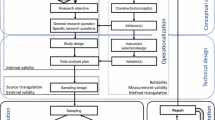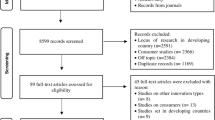Abstract
Despite its vigor, agrifood studies research faces two fault lines: the durability of disciplines, and challenges in engaging non-academic stakeholders. In this essay, I use the concept of boundary work from social studies of science and technology to reflect on the challenges and opportunities for more engaged interdisciplinary research in agrifood studies. I draw on recent field visits to several “sustainable food chain” research projects funded through the Rural Economy and Land Use Programme (RELU), an innovative interdisciplinary research initiative of the UK Research Councils, to highlight the contradictory nature of boundary work in interdisciplinary research. Involving efforts both to bridge interfaces and to separate, exclude and manage other disciplines or stakeholders, boundary work is inherent to interdisciplinarity. Innovations in the organizational culture of projects and in the larger structural context for research can multiply the more generative potential of boundary work, and also yield more and better interdisciplinary research in agrifood studies.
Similar content being viewed by others
References
Bracken, L.J., and E.A. Oughton. 2006. ‘What do you mean?’ The importance of language in developing interdisciplinary research. Transactions of the Institute of British Geographers 31: 371–382.
Gieryn, T.F. 1983. Boundary-work and the demarcation of science from non-science: Strains and interests in professional ideologies of scientists. American Sociological Review 48: 781–795.
Gieryn, T.F. 1999. Cultural boundaries of science: Credibility on the line. Chicago, IL: University of Chicago Press.
Lamont, M., and V. Molnar. 2002. The study of boundaries in the social sciences. Annual Review of Sociology 28: 167–195.
Lattuca, L.R. 2001. Creating interdisciplinarity: Interdisciplinary research and teaching among College and University Faculty. Nashville, TN: Vanderbilt University Press.
Lélé, S., and R.B. Norgaard. 2005. Practicing interdisciplinarity. BioScience 55 (11): 967–975.
Lowe, P., and J. Phillipson. 2006. Reflexive interdisciplinary research: The making of a research programme on the rural economy and land use. Journal of Agricultural Economics 57 (2): 165–184.
MacMynowski, D.P. 2007. Pausing at the brink of interdisciplinarity: Power and knowledge at the meeting of social and biophysical sciences. Ecology and Society 12 (1): 20.
Marzano, M., D.N. Carrs, and S. Bell. 2006. Working to make interdisciplinarity work: Investing in communication and interpersonal relationships. Journal of Agricultural Economics 57 (2): 185–197.
National Academies. 2004. Facilitating interdisciplinary research. Washington, DC: National Academies Press.
Star, S.L., and J.R. Griesemer. 1989. Institutional ecology, ‘translations’ and boundary objects: Amateurs and professionals in Berkeley’s Museum of Vertebrate Zoology, 1907–39. Social Studies of Science 19: 387–420.
Tress, B., G. Tress, and G. Fry. 2006. Defining concepts and process of knowledge production in integrative research. In From landscape research to landscape planning: Aspects of integration, education and application, ed. B. Tress, G. Tress, G. Fry, and P. Opdam, 13–26. Dordrecht, The Netherlands: Springer.
Acknowledgements
Comments from those who read an earlier longer version of this paper presented at the 2007 annual meeting of the Rural Sociological Society in Santa Clara, California provided thoughtful guidance for moving toward the present essay. I especially appreciate the support of an ESRC/SSRC Visiting Fellowship with the UK’s Rural Economy and Land Use Programme, which has stimulated and deepened my thinking on interdisciplinarity.
Author information
Authors and Affiliations
Corresponding author
Rights and permissions
About this article
Cite this article
Hinrichs, C.C. Interdisciplinarity and boundary work: challenges and opportunities for agrifood studies. Agric Hum Values 25, 209–213 (2008). https://doi.org/10.1007/s10460-008-9118-0
Accepted:
Published:
Issue Date:
DOI: https://doi.org/10.1007/s10460-008-9118-0




